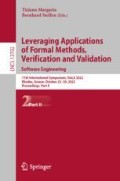Abstract
Data analysis workflows (DAWs) are widely used in the scientific world. However, different communities created a plethora of domain-specific languages (DSLs) to specify their DAWs. Consequently, across DSLs, it is hard to perform operations on DAWs such as share, port, compare, re-use, adapt, or even merge. Thus, we have analyzed DAW specification languages and created a unified DAW metamodel. Given an instance of a DAW specification that can be matched to our metamodel, we are now able to apply CRUD operations (create, read, update, delete), and can potentially translate between different DAW specification languages.
Access this chapter
Tax calculation will be finalised at checkout
Purchases are for personal use only
Notes
- 1.
- 2.
This is only a very basic example meant to provide an intuition. Using tasks that inherently support different kinds of input data is just one other possible solution. Additionally, the output data type must also be considered in a real world example.
References
Stoudt, S., Vásquez, V.N., Martinez, C.C.: Principles for data analysis workflows. PLoS Comput. Biol. 17(3), e1008770 (2021)
Fowler, M.: Domain-Specific Languages. Pearson Education, London (2010)
Tracz, W.: DSSA (Domain-Specific Software Architecture): pedagogical example. SIGSOFT Softw. Eng. Notes 20(3), 49–62 (1995)
Apache airflow project (2022). https://airflow.apache.org/
Di Tommaso, P., Chatzou, M., Floden, E.W., Barja, P.P., Palumbo, E., Notredame, C.: Nextflow enables reproducible computational workflows. Nat. Biotechnol. 35(4), 316–319 (2017)
Rak, R., Rowley, A., Black, W., Ananiadou, S.: Argo: an integrative, interactive, text mining-based workbench supporting curation. Database 1–7, 2012 (2012)
Stackstorm (2022). https://stackstorm.com/
Carbone, P., Katsifodimos, A., Ewen, S., Markl, V., Haridi, S., Tzoumas, K.: Apache flink: stream and batch processing in a single engine. Bull. IEEE Comput. Soc. Tech. Comm. Data Eng. 36(4), 28–38 (2015)
Jain, A., et al.: Fireworks: a dynamic workflow system designed for high-throughput applications. Concurr. Comput. Practic. Exp. 27(17), 5037–5059 (2015)
Prefect (2022). https://docs.prefect.io/
Köster, J., Rahmann, S.: Snakemake-a scalable bioinformatics workflow engine. Bioinformatics 28(19), 2520–2522 (2012)
Luigi (2022). https://github.com/spotify/luigi
Chinosi, M., Trombetta, A.: BPMN: an introduction to the standard. Comput. Stand. Interfaces 34(1), 124–134 (2012)
Camunda (2022). https://camunda.com/bpmn/
Orchestra (2022). https://orchestra.b12.io/
Activiti (2022). https://www.activiti.org/
Atkinson, C., Kühne, T.: Model-driven development: a metamodeling foundation. IEEE Softw. 20(5), 36–41 (2003)
Amstutz, P., et al.: Common workflow language, v1. 0 (2016)
Perkel, J.M.: Workflow systems turn raw data into scientific knowledge. Nature 573, 149–150 (2019)
Szyperski, C., Gruntz, D., Murer, S.: Component Software: Beyond Object-Oriented Programming, 2nd edn. ACM Press/Addison-Wesley, New York (2002)
Schiefer, C., et al.: Portability of scientific workflows in NGS data analysis: a case study. CoRR, abs/2006.03104 (2020)
Brambilla, M., Cabot, J., Wimmer, M.: Model-Driven Software Engineering in Practice. Synthesis Lectures on Software Engineering, 2nd edn. Morgan & Claypool, Vermont (2017)
Grunske, L., Geiger, L., Zündorf, A., Van Eetvelde, N., Van Gorp, P., Varró, D.: Using graph transformation for practical model-driven software engineering. In: Beydeda, S., Book, M., Gruhn, V. (eds.) Model-Driven Software Development, pp. 91–117. Springer, Heidelberg (2005). https://doi.org/10.1007/3-540-28554-7_5
Object Management Group (OMG). OMG Unified Modeling Language (OMG UML®), Version 2.5.1 (2017). https://www.omg.org/spec/UML/2.5.1/PDF
Rupp, C., Queins, S., Zengler, B.: UML 2 glasklar: Praxiswissen für die UML-Modellierung. Hanser (2007)
Metamodel and mappings of specification languages for data analysis workflows (2022). https://github.com/CRC-FONDA/T1-DAW-Metamodel
Boulakia, S.C., Leser, U.: Search, adapt, and reuse: the future of scientific workflows. SIGMOD Rec. 40(2), 6–16 (2011)
Fernandez, R.C., Culhane, W., Watcharapichat, P., Weidlich, M., Morales, V.L., Pietzuch, P.R.: Meta-dataflows: efficient exploratory dataflow jobs. In: Das, G., Jermaine, C.M., Bernstein, P.A. (eds.) Proceedings of the 2018 International Conference on Management of Data, SIGMOD Conference 2018, Houston, TX, USA, 10–15 June 2018, pp. 1157–1172. ACM (2018)
Leser, U., et al.: The Collaborative Research Center FONDA. Datenbank-Spektrum, (1610–1995), November 2021
Aknowledgements
Funded by the Deutsche Forschungsgemeinschaft (DFG, German Research Foundation) - Project-ID 414984028 - SFB 1404 FONDA [29].
Author information
Authors and Affiliations
Corresponding author
Editor information
Editors and Affiliations
Rights and permissions
Copyright information
© 2022 The Author(s), under exclusive license to Springer Nature Switzerland AG
About this paper
Cite this paper
Hilbrich, M., Müller, S., Kulagina, S., Lazik, C., De Mecquenem, N., Grunske, L. (2022). A Consolidated View on Specification Languages for Data Analysis Workflows. In: Margaria, T., Steffen, B. (eds) Leveraging Applications of Formal Methods, Verification and Validation. Software Engineering. ISoLA 2022. Lecture Notes in Computer Science, vol 13702. Springer, Cham. https://doi.org/10.1007/978-3-031-19756-7_12
Download citation
DOI: https://doi.org/10.1007/978-3-031-19756-7_12
Published:
Publisher Name: Springer, Cham
Print ISBN: 978-3-031-19755-0
Online ISBN: 978-3-031-19756-7
eBook Packages: Computer ScienceComputer Science (R0)

